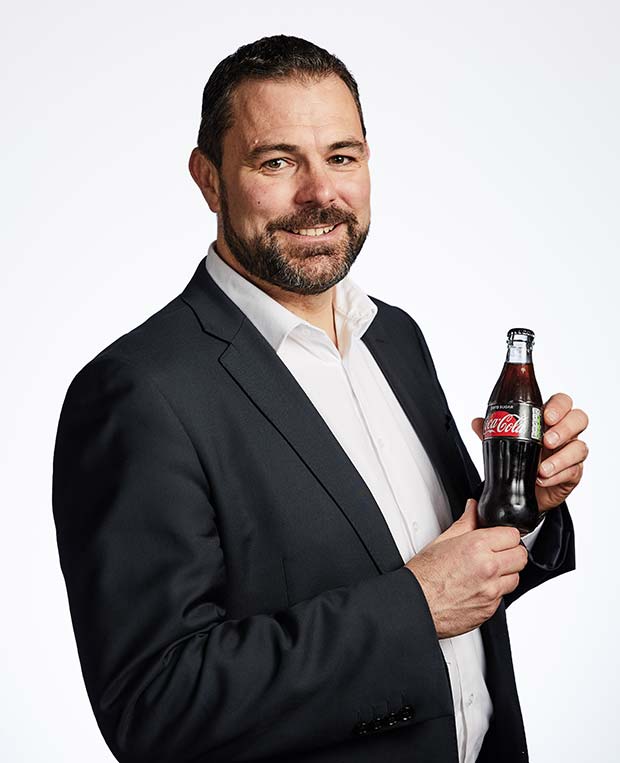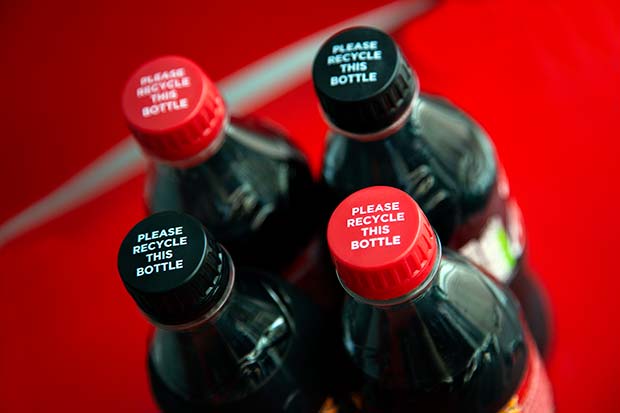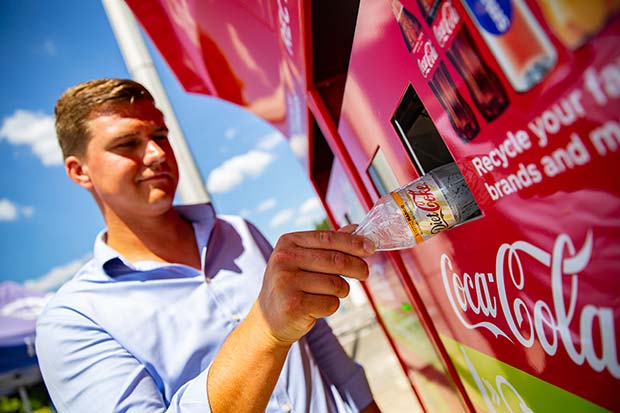Earlier this year Coca-Cola European Partners (CCEP) unveiled their vision for becoming a Total Beverage Company, including major activity for their core brands and the launch of some innovative brands that appeal to the Millennium generation and take CCEP into altogether new territory.
 In an exclusive interview with Wholesale Manager Gary Black, Sales Director for Wholesale and Convenience at CCEP UK spoke about the latest progress of this vision to becoming reality and how CCEP are working with wholesalers to help them maximise the opportunity in their business.
In an exclusive interview with Wholesale Manager Gary Black, Sales Director for Wholesale and Convenience at CCEP UK spoke about the latest progress of this vision to becoming reality and how CCEP are working with wholesalers to help them maximise the opportunity in their business.
As Sales Director – Wholesale & Convenience, Gary is responsible for leading the wholesale and convenience team at CCEP and devising and implementing their Total Beverage vision across this customer base. He explains how it works:
“Wholesalers are the vital part of the chain linking us to thousands of independent operators and the consumers who visit them every day.
We’re committed to supporting them by demonstrating the best way to tailor their soft drinks offer to meet the needs of their diverse customer base, in a variety of environments. To support this, we have increased our field sales support and grown our team of experts who regularly call upon depots and the retailers, publicans and foodservice operators that shop there. We’re more than doubling our field sales visits nationwide to over 750,000 as part of our commitment to reaching more outlets more often and giving them the tools they need to grow their sales, including the right brands and category management advice.”
In another initiative, CCEP’s advancing use of digital technology is improving how they do business, to the benefit of their customers. As an example, CCEP’s new ‘Add-To-Order’ service makes it easier for independent operators to order from their chosen wholesaler, by enabling them to add CCEP products to the next delivery from their chosen route to market in real time while the rep is visiting their store: “This gives customers the confidence and knowledge that any out of stocks or new products are on the way as soon as the order has been confirmed.”
CCEP’s core brands are pillars of the wholesale sector. About 70% of CCEP’s sales in convenience come from their sparkling soft drinks portfolio, which includes Coke, Fanta, Sprite, Dr Pepper, Lilt and Schweppes.
The three Coca-Cola variants – Classic, Diet Coke and Coca-Cola Zero Sugar – make up 70% of all cola sales in convenience. Coca-Cola Classic remains Britain’s most loved and consumed cola, Diet Coke is the No.1 sugar free cola and Coca-Cola Zero Sugar is the fastest growing cola brand, up 30% and growing by 148% in the license channel. Coca- Cola Zero Sugar is now worth well over £210m in the UK.
 Hence CCEP are investing heavily in their low and zero sugar Coca-Cola variants, putting £25 million behind Diet Coke and Coca-Cola Zero Sugar. Diet Coke has been updated with a new, contemporary brand image and three new flavours, Diet Coke Exotic Mango, Diet Coke Feisty Cherry and Coca-Cola Zero Sugar Peach, which have together delivered nearly £11m of sales in the first four months.
Hence CCEP are investing heavily in their low and zero sugar Coca-Cola variants, putting £25 million behind Diet Coke and Coca-Cola Zero Sugar. Diet Coke has been updated with a new, contemporary brand image and three new flavours, Diet Coke Exotic Mango, Diet Coke Feisty Cherry and Coca-Cola Zero Sugar Peach, which have together delivered nearly £11m of sales in the first four months.
“The first part of our strategy is growing our core, ensuring we keep our core products as relevant now as when they launched, with innovations to keep the brand modern, particularly in flavours which Millennials like.
“There are still distribution gaps for Coca-Cola Zero Sugar, which presents a huge opportunity for wholesale and convenience customers given its current growth rate. Health and Wellness is a massive opportunity and as the brand grows in popularity, space on shelf in depot and retail outlets needs to grow to meet consumer demand and prevent out of stocks.”
Looking at CCEP’s other carbonates, Fanta is the no.1 flavoured carbonate brand in convenience, up 9% in the last year and over five times bigger than its nearest competitor. Tapping into the health and wellness trend, Fanta Zero is growing by 101.1% and recruiting new shoppers into the segment. Another CCEP flavoured carbonate, Sprite unveiled a new brand identity and dimpled bottle alongside a new flavour variant, Sprite Lemon Lime and Cucumber.
 CCEP also have brands in the energy, water, juice drink and ice tea segments. In energy, the Monster Energy brand is worth almost £100m in convenience and growing by 22%, driven by CCEP’s investment in NPD, including low and zero sugar variants, a core range that continues to grow, and marketing campaigns and sponsorships. Monster Energy Ultra Violet launched in early 2018, the fifth addition to the Monster Energy Ultra family, which has grown over £13m in the last 12 months to nearly £40m in two years. Monster Energy’s Punch range was the second highest growth contributor to the energy sector in 2017, with two new flavours this year, Monster Pipeline Punch and Monster Mango Loco. Flavoured energy drinks have grown over £24million, with taste the main factor in purchase decisions. Of CCEP’s other brands, glaceau smart water is a Top 5 water brand in convenience, while Oasis and Capri-Sun are the second and third largest juice drink brands in the sector.
CCEP also have brands in the energy, water, juice drink and ice tea segments. In energy, the Monster Energy brand is worth almost £100m in convenience and growing by 22%, driven by CCEP’s investment in NPD, including low and zero sugar variants, a core range that continues to grow, and marketing campaigns and sponsorships. Monster Energy Ultra Violet launched in early 2018, the fifth addition to the Monster Energy Ultra family, which has grown over £13m in the last 12 months to nearly £40m in two years. Monster Energy’s Punch range was the second highest growth contributor to the energy sector in 2017, with two new flavours this year, Monster Pipeline Punch and Monster Mango Loco. Flavoured energy drinks have grown over £24million, with taste the main factor in purchase decisions. Of CCEP’s other brands, glaceau smart water is a Top 5 water brand in convenience, while Oasis and Capri-Sun are the second and third largest juice drink brands in the sector.
Oasis Aquashock, introduced in March, offers consumers a ‘hot’ or ‘cold’ hydration experience without the calories or added sugar and containing natural flavours. Exempt from the sugar tax, Oasis Aquashock Spicy Raspberry and Chilled Cherry should be stocked alongside other flavoured waters in the water chiller.
Alongside backing the core brands another part of CCEP’s strategy to evolve into a total beverage company is ‘Adding Some More’, as Gary Black explains: “We’re famous for our carbonates but consumers aren’t always looking for those. Hence we are adding more products, appealing to more consumers and bringing in more sales for more customers.”
CCEP introduced three new ‘Adding Some More’ brands in the first half of the year. Gary describes the launch of two of these, Adez, a plant based dairyfree smoothie and Honest Organic Ready to Drink Coffee, as “seeding products into key environments and getting the company into outlets where the people are.”
It was a much more mainstream launch for the third new brand, Fuze Tea, which went live in February. Designed to appeal to millennials, who are the UK’s largest iced tea consumers, Fuze Tea is CCEP’s first mainstream venture into this sub-category, a premium, low-calorie blend of fruits, botanicals and tea made with 100% sustainably-sourced tea leaves and available in two variants, Black Tea Peach Escape and Green Tea Mango Harmony. Fuze Tea is supported by a multi-million pound marketing campaign, including samplings.
“People have misconceptions of how ice tea tastes. Fuze Tea is an opportunity to take a tea-based drink and match it to the UK palate.”
As a leading soft drinks supplier, CCEP were ahead of the game with the sugar tax, says Gary. When the tax came into force on 6th April, 95% of their soft drinks were already levy exempt. CCEP have launched 32 new drinks with no or less sugar since 2005, helping people reduce the sugar intake from their soft drinks offer.
The sugar tax increased soft drink prices at a stroke, but CCEP have also reviewed the pack sizes of Coca-Cola, Diet Coke and Coca-Cola Zero Sugar to keep their brands as affordable as possible for consumers. Some packs of Coca-Cola Classic are now smaller: the 1.75L retail bottle will be replaced with a 1.5L bottle. As always, pricing is at the retailer’s discretion.
 Low and zero sugar variants have continue to grow since the tax came in on 6th April. For example Coca-Cola Zero Sugar is the fastest growing cola brand in the convenience channel, up 30 and the brand is now worth well over £210m in GB.
Low and zero sugar variants have continue to grow since the tax came in on 6th April. For example Coca-Cola Zero Sugar is the fastest growing cola brand in the convenience channel, up 30 and the brand is now worth well over £210m in GB.
It’s been a year full of dramas, with the Beast from The East, the CO2 shortage and the recent heatwave. But Gary Black isn’t phased by it:
“We successfully maintained production of our soft drinks throughout the CO2 shortage, unprecedented weather conditions and World Cup period, continuing to fulfil orders and maintain strong customer service. We continue to work with our customers as our glorious summer continues. There are always challenges, which are not always bad news! For instance, the hard winter benefited local stores, who saw a real surge in sales.
Summer is always a huge opportunity, the biggest single sales period from the end of April to September and carrying on into October. The market only grows further when the weather is glorious like it has been.”
As always, CCEP has been backing its customers this summer with various campaigns. For the 2018 World Cup they linked up with EA Sports and FIFA, backed by £2.5 M of on-pack marketing. They also supported the licensed channel during the championship: “It was a massive success. We drove the licensed trade with over 8,000 activation kits.”
CCEP has also brought back the Coke Summer campaign for the third year: “For Millennials, life is all about experience and we’ve been giving them some unforgettable experiences, with redemptions running very high.
“We work with wholesalers to help them achieve the right selection of beverages. It starts with understanding the environment the wholesaler trades in and picking products that are well supported and developed in response to what consumers want. We have a good look at duplication: ranges shouldn’t be too broad and you need to keep the fixture easy to shop.
“Thinking about the category five years back, it’s important that depots have adequate space for the different parts – energy, water and zero sugar drinks – which have all grown.”
Gary is quite comfortable with the structural changes taking place in the wholesale industry, in terms of consolidation of ownership:
“Our business has had much experience in managing through change. We operate in a buoyant growth category and have a strong portfolio of muchloved brands and exciting new products that appeal to a variety of tastes, audiences and occasions across a number of trading environments. We continue to work closely with our customers, collaborating on business plans to drive mutual and sustainable growth. Overall we are really excited about the future and the opportunities we are still yet to explore with our trading partners.”
It’s about understanding consumer trends and changes in the environment and helping wholesalers take advantage: “They are serving a broadening environment which is seeing growth in areas like food on the go. It’s about putting the customer at the heart of the business.”
As a company churning out many millions of bottles and cans every year, CCEP is very serious about taking responsibility for the impact of the environment from all this packaging.
Last summer, 2017, they launched a dedicated sustainability strategy. The first part is to ensure their packaging is sustainable. CCEP’s plastic bottles are already recyclable and the aim is to double the amount of recycled packaging in each bottle to 50% by 2020. CCEP continue to work with industry leaders in championing regional recycling systems, with schemes to boost the level of recycling. By the end of 2018 all CCEP’s large PET bottles will be 40% recycled PET versus 25% at present.
The second strand is consumer awareness and harnessing the power of their brands. CCEP recently ran a “love story” commercial about recycling, with two bottles on a park bench on TV and in digital media. There are also recycling messages on the lids of 500ml bottles, and in September a new branded recycling campaign starts.
Links with litter clean up campaigns are not new for CCEP, of course. Their first partnership with Keep Britain Tidy was in 1965. They are also part of Keep Britain Tidy’s Great British Spring Clean initiative. As Gary points out, “Any local business, whether a cash & carry or a retailer, has a real opportunity to work with the Great British Spring Clean.”
CCEP have been involved in detailed discussions with industry and in consumer trials of Recycle On The Go machines at UK attractions in theme parks, Alton Towers and Thorpe Park. Gary mentions research findings that 64% of consumers would recycle more if they were rewarded.
Going back to CCEP’s work with wholesalers, an important business trend CCEP is looking at in wholesale is the digital opportunity. Around 9% of the population buys groceries online, but in B2B the ecommerce proportion is far higher:
“We’re seeing double figures in some wholesale environments. We need to help our wholesale partners, hence our dedicated resource for this sector, which we’re really proud of. We’ve carried out some strong research into what customers want from wholesalers’ websites and how they find promotions. There’s always an opportunity to optimise. The way wholesalers’ customers buy online is relatively new: sometimes it’s just about wholesalers putting a product image online, getting the basics right, then trying out new ideas, for example looking at cross category adjacencies. Wholesalers’ ecommerce customers spend more per basket. Digital comes with a wealth of data about customers’ buying habits.”
In the last 12 months Gary says the wholesale and convenience side of the business has seen greater collaboration all round. As well as the ‘Add-To-Order’ service CCEP launched recently, suppliers, wholesalers, retailers and food to go customers are all using data to understand the customer base better:
“Digital technology is being adopted on a wider scale and ‘online’ is being used properly. Next we’re looking at how our sales teams can work together with the wholesalers’ to get the message right for the customers.
“From here, we need to focus on the trading environment and getting the right assortment to capitalise on wholesalers’ trade across different environments. We need to continue to shift the mix into light colas and get the space management right with the right range, driving distribution of low sugar products and covering the changing beverage market.”




Comments are closed.